Peter MALONE
Saturday, 18 September 2021 19:22
Career

CAREER
US, 1959, 105 minutes, Black and white.
Anthony Franciosa, Dean Martin, Shirley Mac Laine , Carolyn Jones, Joan Blackman, Robert Middleton, Donna Douglas, Jerry Paris.
Directed by Joseph Anthony.
Career is a title which sums up the film. The focus is on an actor who is willing to sacrifice everything so that he can be successful. Anthony Franciosa is very good in the central role – winning a Golden Globe in 1960 for best actor.
There is very strong support from Dean Martin and Shirley Mac Laine and a small role from the ever reliable Carolyn Jones.
At this time, Anthony Franciosa had made his mark in a number of films including A Hatful of Rain and The Naked Maja. Dean Martin had separated from Jerry Lewis for three years and was also making his mark in more serious films like The Young Lions. Shirley Mac Laine was also establishing her career and was teamed with Dean Martin in Some Came Running at this time.
The director is Joseph Anthony who was best known as a Broadway stage director. From the mid-1950s he made only four feature films which were striking in their way: The Rainmaker with Burt Lancaster and Katharine Hepburn, The Matchmaker with Shirley Booth (the basis for Hello Dolly), Career and, again with Shirley Mac Laine, All in a Night’s Work.
1. The baldness and emphasis of the title, indication of themes, irony?
2. Was it evident the film was based on a play, staginess in the presentation, the emphasis on dialogue? The black and white photography? The emphasis on the stars?
3. Did the film have an authentic atmosphere? How credible was the plot, characters, crises? The flashback structure and its irony as regards Sam, his past and his future?
4. The atmosphere of the small town? Sam and his hopes after the wry hopes, the goodbye, the relationship with Barbara, and her devotion to him, even as an actor? The friends he left behind who prepared?
5. The contract with New York and its cruelty for men out of work, the length of time passing without jobs, the landlady? Barbara coming to New York, her disappointment, the marriage? Her expectations, her not being able to understand, the contrast with the friends who had made good and were wealthy, splashing money on their visits to New York? The effect on Sam?
6. The chance encounter with Maury? His style and ambitions, the pressures that he put on Sam? Sam’s work at the Actors’ Rostrum? The irony of the later Communist associations? Maury and his moving in with Sam, using him? His using Sharon?
7. Comment on the strengths in Sam’s character, his weaknesses? His talent for acting, his lack of ability? His lack of push? His desperation at auditions? The significance of the argument with Kensington? Maury’s advice of not to beg?
8. The effect on Sam of the clash with Barbara? Her miscarriage? Was it credible that she should want to opt out of the marriage? The way that she handled the divorce?
9. The strengths and weaknesses of Maury and his character? The way he used people, his skill, his use of Sharon? The transition to Hollywood, his response to being successful, his patronizing of Sam during his visit, ignoring him, wanting big names for plays and hurting Sam? The importance of the argument about Sam’s star casting in the play and telling him that he was not a star?
10. The picture of Hollywood, the contrast with acting on the road? Sam on the road?
11. The relationship between Sharon and Maury, Sam taking Sharon on the rebound? The motives for marrying her? His hope for success? Kensington's ultimatum about the relationship? The effect on his acting? Sharon and her wanting the divorce? Sam’s blackmailing Maury and Sharon? The harshness between the two, at the
rehearsals and Sam being sacked?
12. The contrast with Shirley Drake, as a person, her skill at her work, her loneliness with her mother and the cats? Her helping Sam. Liking him? Sharing his ups and downs?
13. The influence of Korea? A new chance for Sam, success? The contrast with returning home, the Red scare? His accepting work as a waiter? Building himself up and yet hoping for an acting job?
14. The contrast with seeing Maury and Sharon down? Their begging him? His spurning them? What had Maury and Sharon achieved? The Actors' Rostrum, marriage and the family?
15. The effect of the encounter with Barbara on Sam, her respect for him and understanding. as a motivation for pushing his way to the top, his work, success and applause? What had happened to him in the meantime? How ruthless, how happy?
16. Shirley's asking him was it all worth it? His response in the affirmative? Would the audience agree?
Published in Movie Reviews
Published in
Movie Reviews
Tagged under
Saturday, 18 September 2021 19:22
Captive Heart, The
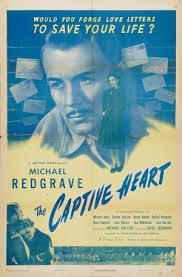
THE CAPTIVE HEART
UK, 1946, 104 minutes, Black and white.
Michael Redgrave, Rachel Kempson, Frederick Leister, Mervyn Johns, Rachel Thomas, Jack Warner, Gladys Henson, Gordon Jackson, Derek Bond, Mariel Forbes.
Directed by Basil Dearden.
The Captive Heart was made just after World War Two and filmed in an actual prison. It is the story of post-Dunkirk activity when many British were imprisoned in concentration camps.
Michael Redgrave is an escapee who assumes the identity of a British officer – and to conceal his true identity during his years of internment, he has to correspond with the dead officer’s wife. The wife is played by Rachel Kempson, Michael Redgrave’s wife in real life.
There are some very strong and stalwart British actors in support especially Jack Warner and Gordon Jackson. The direction is by Basil Dearden who began directing at the beginning of World War Two and continued during the war with small-budget films. However, his contributions to the omnibus film, Dead of Night, led to The Captive Heart, to bigger-budget films and a great number of significant small films during the 1950s. One that stands out is his police story, The Blue Lamp, with Jack Warner and Dirk Bogarde.
At the end of the 1950s he made some significant films with social comment, Sapphire about racism, Victim, with Dirk Bogarde, about homosexuality. His biggest-budget film and most spectacular was Khartoum in 1966 with Laurence Olivier and Charlton Heston.
This film is interesting to see in the light of its being made in 1946, capturing the spirit in Britain immediately after the end of World War Two as it began to reflect on its war experiences.
1. What was the emotional impact of this film? What must have been its impact in its time? Why? The significance of the, title and its tone?
2. What was the value of such war dramas? What would have been the value in the mid-40s? As part of history? Now?
3. Comment on the British style of this film? Its underplaying of high adventure? Its British presentation of emotion? How genuine did it seem?
4. The use of the documentary flavour of the film, the blending of fiction and fact? A sense of realism about these men and these happenings?
5. How appropriate was the flashback technique? The interchanging of two worlds, of the present and the past? The observation of human nature in different situations? How did this add to the value of the film and its emotional impact?
6. The effect on these men of being captured so early in the war? The presentation of the prison camps? The hard aspects and the easy aspects? Men transferred from ordinary jobs into such a life for so many years? Friendship, the fights? The difficult adaptation? The hopes, the attempts to escape? The impact of death? Lives and times passing, the gaps in their life? How well was this communicated? Which sequences illustrated it best?
7. How interesting were the British as presented in the film? Dalrymple as the commanding officer, his style, stiff upper lip, his betting background, his concern for the men? Ted and Di as ordinary men, their background, family, wives and children, very ordinary British style? Matthews as a young robber, throwing his weight around, learning some self-sacrifice and growing up in the camp? Stephen and the contrast with his artistic background, the emotional complexities of his life? David as the ordinary Scotsman, the sadness of his being blind, his memory of his mother and girlfriend, his suffering, the fact that he could not be operated on? The ordinary soldiers, the suspicious soldiers? Was this an adequate cross section of British life?
8. How interesting a character was Rasek? The introduction into the film, his background as a Czech intellectual, the Nazi persecution, his decision to assume British identity? How genuine a sympathetic person was he? The initial hostility, the change to helping him? Living his life in the camp in fear? The ever present danger of Forster recognizing him? The necessity of writing in his new identity? How did this change him? His need to escape? his capacity for love? the truth dawning on him? The title as referring to him?
9. How attractive a person was Celia? The change in her life with the letters coming from the camp? The hopes building up over the years? The importance of knowing the truth? Was the ending appropriate, right amount of sentiment and fulfilment? The title as referring to her?
10. The emotional impact of Ted and Di returning home? The simple greeting of the wife? Di’s dead wife? Starting work again? Seeing the baby for the first time? This as communicating the realities of homecoming?
11. How satisfactory the melodramatics of Stephen and his love for Caroline? Darrel and the melodramatic jealousy?
12. The simplicity of David and Elizabeth reconciling even though he was blind?
13. How important was detail in this film, such sequences as the concert, the digging of the tunnel, Matthew’s plan for changing the name and its execution, the reality of death?
14. What comment on human nature, life, and time passing, the war, did this film give?
Published in Movie Reviews
Published in
Movie Reviews
Tagged under
Saturday, 18 September 2021 19:22
Captive City
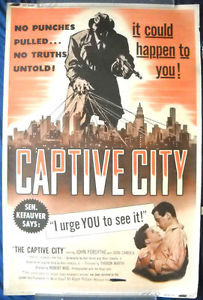
CAPTIVE CITY
US, 1952, 91 minutes, Black and white.
John Forsythe, Joan Camden.
Directed by Robert Wise.
Captive City is a film that is critical of the Mafia. It is a portrait of a small city, anonymous, and the influence of corruption in the management of the town. The film focuses on a journalist who arrives at a police station and, in flashback, tells his experiences. A private detective investigating the city and the gangster bosses has been killed. The risk is for the journalist to expose the criminals.
The film portrays the police, ordinary people in the town, the religious minister, the business people. It also shows the media and their response.
The film is one of those social conscience films – and relied on its message rather than on its cast, John Forsythe being more at the beginning of his career on big screen and small screen.
The film was directed by Robert Wise who began as an editor with some of Val Lewton’s horror films in the 1940s, even directing The Body Snatchers. For about ten years he directed small-budget films of all kinds of genre including The Day the Earth Stood Still and The Desert Rats. However, with Cinemascope he moved into bigger-budget films and won Oscars for West Side Story and The Sound of Music.
1. What is the impact of this film now? With a background of so many similar T.V. programs? Its authenticity from the 50s? Can its 1950s impact be gauged from the style of the film? How? On this basis, is it a good film?
2. What is the value of such social dramas? As moral social dramas in their time? As documents illustrating attitudes of the past? How valuable is this film?
3. How successful is the technique of documentary? 50s style realism, the moralising, and explicit words of the senator at the end? Is this convincing?
4. How successful was the screenplay, the initial crisis situation, the flash backs to this atmosphere, the selection of comments and incidents because of the flashbacks, the driving force and suspense, the senator’s speech at the end?
5. The impact of insight into the Mafia? The fifties and the seventies by comparison? The points made about small unknown influences, in small country cities, small rackets but the impact of the Mafia? Does this compare with what we know now?
6. How did the film, convey the reality of the evil and the menace of the Mafia in this particular town? Was it convincing?
7. How important was it to have Jim Austin as an ordinary citizen? Was he a convincing character? His role in the town, his scepticism, his growing involvement, the risks to life, business? How admirable a character was he?
8. Why did he carry on his crusade? What values did he stand for and believe in? Why? The theme of a man taking responsibility and its repercussions?
9. How important was the role of his wife, in support, warning him with her fears, co-operating? Was this convincing and human?
10. The influence of Don, the co-editor? His fear about business, leaving evil alone etc? The photographer and his taking the risks? The criticism of his mother?
11. How realistic was the police situation in the film? Administering the town under orders? Under the power and Influence of the Mafia?
12. The role of the bookmakers in the film? Their influence in the town, running their own businesses, being taken over by gangsters?
13. The repercussions of this in protection rackets, murders, deceit and wrecked lives? The main bookmaker and his wife and her death? The murder and the informer?
14. Did this seem real? Were the issues real? What is their validity today?
Published in Movie Reviews
Published in
Movie Reviews
Tagged under
Saturday, 18 September 2021 19:22
Captain Kronos, Vampire Hunter
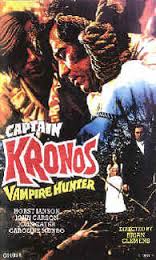
CAPTAIN KRONOS, VAMPIRE HUNTER.
UK, 1971, 94 minutes, Colour.
Horst Janson, John Carson, Shane Briant, Caroline Munro.
Directed by Brian Clemens.
An off-beat vampire thriller made by the team responsible for the television series The Avengers. It is routine material but is a tongue-in-cheek example of the British spoofing the vampire tradition. This was very popular in the Hammer Studios' films of the late sixties and early seventies. Dracula was to have a much more serious re-birth of popularity in the late seventies as well as even more parodies and spoofs. An unusual vampire thriller.
1. What are the expectations from the title? As regards the hero, the vampires, the parody and style?
2. Why do horror films appeal to audiences? Involvement in suspense, the deeper understanding behind the myth of vampires, life and death, evil? The conquest of evil? How were these presuppositions incorporated into this film?
3. The value of the locations, the town and its background, the mansion? The forest?
4. The film’s reliance on dramatic effects, for example the vampire in the cloak, the aging of the victim , the storms, the final sword play?
5. The film’s detailed explanation of the myths about vampires, the variety of stories. the role of the hunters of the vampires? (How seriously to be taken?)
6. The situation and the town? The audience suspecting the children, their visit, the cemetery, their mysterious mother and her vengeance, the detailed presentation of the house and its sinister aspects, the aristocracy and their manners? The irony of the parents as the real villains? The effect of this final revelation? Audience judgement?
7. How was Kronos a hero? the night on the house, his vigil before striking, yet his sensuality and violence, his look and his accent? How comic, how serious? His assistant with his hunch and his knowledge of vampire law? The vagabond girl rescued and accompanying them? Asking herself for Kronos? How conventional?
8. The doctor in the village, a serious character, his investigations, giving his life for the others? The various ways in which he was killed? The horror and the violence of this?
9. The assassins in the inn? reason for this sequence? Kronos’s swordplay and the preparation for the ending?
10. The final encounter? The hypnotised children, the heroine in peril, the sinister villainess and the revelation of the truth, the sinister vampire, the professor and his understanding, Kronos and his sword-play? The appropriate climax for this film?
11. How appropriate the ending, the irony in Kronos continuing his vampire hunts?
12. The values underlying the style of this film, its gathering from all vampire films, the ironic dialogue and touches? How serious?
Published in Movie Reviews
Published in
Movie Reviews
Tagged under
Saturday, 18 September 2021 19:22
Cannon for Cordoba
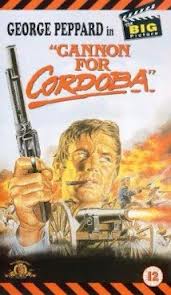
CANNON FOR CORDOBA
US, 1970, 106 minutes, Colour.
George Peppard, Giovanna Ralli, Pete Duel, Raf Vallone, Don Gordon.
Directed by Paul Wendkos.
Cannon for Cordoba is routine colourful Mexican adventure drama, starring George Peppard at the height of his heroic lead popularity and directed by Paul Wendkos, a veteran of many adventure films and telemovies.
1. How successful a western Mexican adventure?
2. The use of standard conventions? Standard plot? The importance of Panavision, colour, locations, action conventions? Rousing musical score?
3. The reasons for continued audience interest, suspense, the quality of action? The impact of the violence?
4. Themes of violence, greed, harsh relationships, the ugliness of human nature?
5. What kind of hero was Douglas? His hardness and harshness? His dedication to his work? His allowing people to die rather than betray his mission? His work on his missions? His relentlessness? His using of men? Using
of women, for example the stripper? His using of Warner in times of danger? What was his achievement in rounding up his men, carrying them through their mission, getting Cordoba and the cannons? What kind of hero was he?
6. How important was the contrast with Harkness? His brother’s death and its constant reminder during the film? His motivation for revenge on Douglas yet his following him? His loyalty, yet the final confrontation of violence, his inability to harm Douglas?
7. The contribution of Rice and Andros to the mission? Their prison background, their genial personalities, American and Mexican loyalties? Their contribution to the mission, the irony and pathos of their deaths? The role of
Guttierez? A Mexican patriot? His motivations against Cordoba?
8. How credible a villain was Cordoba? As a cruel tyrant? His sadistic assistant? His ruthlessness? His capturing of the cannon? His susceptibility to women? His actually being tricked? The irony of his being shot by his soldiers?
9. The contribution of Leonora? Her personality, her revenge on Cordoba, her betrayal of Guttierez, her participation in the final escape?
10. The contribution of the minor characters, the American soldiers and cowboys, the Mexicans, Cordoba’s men, Warner and his money-making betrayal, General Pershing?
11. The cannon as symbolic of this kind of adventure in the west?
Published in Movie Reviews
Published in
Movie Reviews
Tagged under
Saturday, 18 September 2021 19:22
Can Hieronymus Merkin Ever Forget Mercy Hump and Find Happiness?
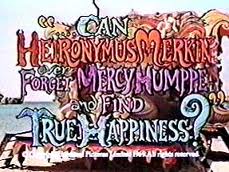
CAN HIERONYMUS MERKIN EVER FORGET MERCY HUMP AND FIND TRUE HAPPINESS?
UK, 1969, 107 minutes, Colour.
Anthony Newley, Joan Collins, George Jessell, Milton Berle, Bruce Forsyth, Patricia Hayes, Alexander and Tara Newley.
Directed by Anthony Newley.
A fantasia-autobiographical film with an irony that Newley and Joan Collins were divorced not so long afterwards. However. the film has many interesting aspects including George Jessel as the Devil. It probably was a bit ahead of its time in its use of fantasy and invention. It does not have universal appeal but is an interesting example of popular experimental film-making and throws light on the work and career of Anthony Newley, his performances (since his childhood) and the musicals, Stop the World I Want to Get Off and The Roar of the Greasepaint.
I. How enjoyable was this comedy? The various facets for interesting audiences? Was it entertaining? For what kind of audience was the film made? why was it made?
2. The impression of the title,. it's style and meaning? The use of the language? The use of names and their sexual overtones? This as a basic expectation for the film? How appropriate, enjoyable, thematic?
3. How important was the film’s use of colour, location photography, fantasy styles, the use of songs and the lyrics for themes, the musical background, the musical kinds of comedy and patter? How well did they all combine? Was the film stylish or pretentious?
4. The device of a film within a film? How well-used? How involving of the audience in Hieronymus's life and its meaning? The fact that it was a process and more reels were needed before it ended? The distancing technique, the audience knowing they are watching a film? The use of techniques of film-making to highlight themes? was this unobtrusive, too obtrusive, just right for this kind of film ?
5. The film was autobiographical in style. How did it retain interest in its central character? Was he a hero? Anthony Newley and his personality? The cover of Hieronymus Merkin? What type was he? Did the film justify his right to show us his life? Justify interest in his life for an audience? The value of his life? The device used was very much like a sex movie. The implications of this?
6. What kind of personality did Hieronymus Merkin have? As he showed it? What were the positive attitudes? How could he be condemned? How much self-criticism? The use of the clown, the mime, the Everyman figure, the Everyman in the rather confused 20th century? The man who has some kind of meaning but is unable to find it?
7. The man who continually makes mistakes and hurts others? Was this well communicated? Which devices helped particularly?
8. Hieronymus as explained by his past? The presence of his mother and her adulation? Her uncritical praise and the memories of the past? The influence and significance of Uncle Limelight? The gradual build-up of life as burlesque, modern morality play? The significance of Eddie Filth and the devil figure? How evil was Filth? His being a procurer? Was this the appropriate emphasis on the devil and his evil? The contrast with the presence and his humour? Was he an angel figure? The angel of death and fear? The function of temptations for Hieronymus? An adequate symbol for life?
9. Audience sympathy for Filigre? Her marriage to Hieronymus? The shot-gun marriage and the repercussions? Children? Hieronymus and responsibility and shirking responsibility?
10. Polyester as attractive? (Anthony Newley's actual wife?) Polyester as a temptation, as an alternative to Filigre? What attracted him? His sense of responsibility and selfishness?
11. Mercy Humpe as a symbol of young sexuality? The picturing of her in fantasy? What did this reveal about Hieronymus and his drives and ambitions? his selfishness, his capacity to relate? Would he find true happiness with her?
12. The role of the children in the film? A sense of reality and responsibility? The fact that they are watching the film? The presence of the grandmother, Filigre? Polyester?
13. The significance of the writers and the critics present at the film? Satire on their protestations? The type of dialogue, the type of caricature? Their influence on Hieronymus? As temptations for his art and work against reality and responsibility?
14. The quality of the dialogue, the quality of the songs and their significance, their staging? The use of circus and clowns?
15. The comparison is made with Fellini. Is this adequate? The fantasy devices for film as introduced by Fellini? Their use here? Original or derivative? Does this matter?
16. The critics were strongly against the film, condemning it as pretentious. They said Anthony Newley was self indulgent. How true is this?
17. What possibilities did the film open up in terms of fantasy and autobiography: realistic presentation of life, the use of cinema techniques for realism and fantasy and their intermingling? The fact that the film was unfinished and more life had to be led?
18. Was this a valid means of insight into modern people and their predicaments?
Published in Movie Reviews
Published in
Movie Reviews
Tagged under
Saturday, 18 September 2021 19:22
Can Can
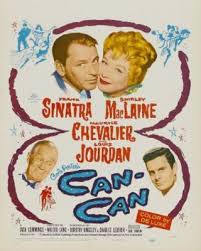
CAN CAN
US, 1960, 131 minutes, Colour.
Frank Sinatra, Shirley Mac Laine, Maurice Chevalier, Juliet Prowse, Louis Jourdan, Marcel Dalio.
Directed by Walter Lang.
Can Can is a big brassy musical culminating the fifties and its musical styles.
Walter Lang who had made quite a number of musicals, for example with Betty Grable, and There’s No Business Like Show Business, during the forties and fifties, directs.
Frank Sinatra is at home in this kind of role and Shirley Mac Laine anticipates Irma La Douce. Louis Jourdan and Maurice Chevalier are very reminiscent of their roles in Gigi. Cole Porter's songs are used. The film is quite colourfully humorous and Cole Porter’s songs have their own particular arresting style. However the overall effect, while enjoyable, also seems garish and somewhat strained.
1. The expectations of the title? Col Porter’s music, the stars? The conventions of musical comedy?
2. The contribution of Cole Porter’s songs and the singing and staging? The contribution of the stars to the style?
3. The placing of the songs, their dramatic impact? The dance sequences? The Eden ballet? The can can itself, The quality of the choreography and the presentation of the dances?
4. The musical comedy plot? How contrived, how real? Sufficient for the purposes of musical comedy?
5. Colour photography,. Panavision, Paris, 1886, cabarets? The quality of colour/ the touch of garishness ? Appropriate?
6. The theme of the law, the can can itself, attitudes of censorship? The courts? The ease with which the people were persuaded of the legitimacy of the can can? The tongue in cheek criticism of the censorious types?
7. Simone as the focus? Shirley Mac Laine’s style and verve? Owning the cabaret, emotional dancer, the ambiguity of her cabaret, the touch of the brothel? The appeal to two types of men, Francois and Philippe? Her capacity for love, unsure as regards her reaction? Her exuberance with the dance? With Paul Barriere? The law, her reaction in jail, court? Her reaction at the party and her humiliation after the dance? Her shrewdness in working on the fraud as regards Francois? Her change of heart? A character portrayal suitable for this kind of contrived comedy?
8. The contrast between Francois and Philippe? Frank Sinatra’s style and the suavity of Louis Jourdan? What types of men did they represent? Different attitudes towards the law? Simone appealing to both? Francois’ taking her for granted and yet charming her? Philippe and his courtesy? The humour of the shutting of the window? Their different attitudes towards love and marriage? The devices for presenting each of their romantic attitudes?
9. Maurice Chevalier in typical style? The character of Paul, the Gallic attitude towards law, friendship with Francois, with Philippe? The songs with Philippe? A pleasant character?
10. The presentation of the dancers and their personalities?
11. The romantic atmosphere - conventional attitudes towards marriage?
12. Themes of marriage, class, style, faux pas?
13. The moralising points that come through a conventional musical comedy? The happy ending?
Published in Movie Reviews
Published in
Movie Reviews
Tagged under
Saturday, 18 September 2021 19:22
Czarina
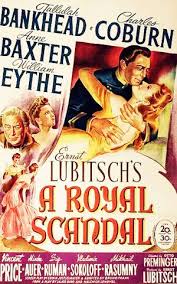
CZARINA
US, 1945, 94 minutes, Black and white.
Tallulah Bankhead, Charles Coburn, Anne Baxter, William Eythe, Vincent Price, Mischa Auer, Sig Rumann.
Directed by Ernst Lubitsch and Otto Preminger.
Czarina was something of a surprise in the mid-1940s. There had been several films about Catherine the Great including Elizabeth Bergner as Catherine the Great in the 1930s and Marlene Dietrich as The Scarlet Empress. Jeanne Moreau was to portray her in Great Catherine in the 1960s.
However, this is a farcical presentation of Catherine the Great and her court. Stage actress Tallulah Bankhead obviously enjoys herself in this role. The film is fast-paced, witty, elegant – and self-mocking.
There is a strong cast including Charles Coburn as the chancellor, Anne Baxter as the countess who sees her fiancé, played by William Eythe, being stalked by the empress. Vincent Price is the French ambassador.
The film was prepared by Ernst Lubitsch who had treated the material previously in a silent film, A Royal Scandal. The film was directed also by Otto Preminger – not noted for the Lubitsch touch (though he did complete That Lady in Ermine in 1948 after Lubitsch’s death). The film was made just after Preminger made Laura and before Forever Amber – and he was at the beginning of a very successful career.
1. What kind of film was this? For a forties audience? For what kind of audience? Popular, specialized? Its impact now with later developments of parody and historical parody?
2. The credentials of the making of the film: the old world quality of its producer, the Germanic style of directing of the director, Tallulah Bankhead and her stage reputation? The stars?
3. The importance of style, black and white photography, the suggestions of 18th century Russia and its court? The domestic melodrama and satiric comedy in this setting?
4. Was it evident that the film was based on a play? Staging, restriction of scenes to interiors, the dialogue and its quality? The ironic dialogue and the value of punch lines? Contemporary jargon and wording for 18th century Russian style?
5. Audience interest in and response to Catherine the Great and her reputation? Her serious place on the throne in Russia and the age of despotism and the enlightenment? An a subject for satire and send-up? Tallulah Bankhead's reputation on stage? Her casting in a rare film for Catherine the Great? Her presence as a Queen, appearance, passion, foibles? Romantic attitudes, feminine touches? Political know-how, diplomatic skill, shrewdness in assessing people and using wiles? The strengths and weaknesses of the framework of this kind of film?
6. The portrait of the Chancellor - old, dishonest, likable, his humorous way of talking, his shrewdness? His sentimental attitude towards Anna? His reliance on the French and the formalities of his meeting with the French Ambassador and their sharing notes, for instance about Polish dances? His diplomacy, manoeuvring Catherine? His reaction to the Captain's intrusion? His knowing about the revolt and his using the situation for his own purposes? His making a slave of the leading General? His getting his way in the end? A comic performance, a comic presentation of a chancellor with his power, capacity for good and evil?
7. The Captain and his impetuosity, the efforts that he made to get in, the trouble he caused, the man in charge of the East Gate, the Chancellor, the Empress herself? As the hero of the film, the dashing forties appearance, the Empress's stress on his looking good in white uniform, his being Anna’s fiance? His loyalty, naivety? His story from the front, impressing the Empress? Her decision to have him about, seduce him? His response to her interest, the champagne? His reports on Russia? His work for the peasants and the ironic comedy dialogue about peasants? his being idle in his job looking after the palace guards? Anna’s challenge and his ignoring of it? His status with the generals, his fighting and wounding the General for the Empress’s reputation? His disillusionment with her? His passion for her, calling her by her name, intrusions into her presence? His reaction against her? His being tried? The appropriate happy ending? What did he represent in terms of satire and parody on the romantic hero?
8. Anna as the romantic heroine? Her appearance, work at the Court, her service of the Empress, her worry about the Captain, the importance of the fight verbally and physically with the Empress? The manoeuvring about her holiday with her mother? Her coming to plead and her attacking the Empress? The happy ending? A strong kind of heroine for this kind of parody?
9. How successful was the interplay of attitudes, types, power manipulation, parody of behaviour in the 20th and the 18th century?
10. The satiric portrait of the generals, their planning, their lack of military awareness?
11. The diplomacy of the French and the satire on the French manner and its place in the Russian Court? The French Ambassador winning the day with the Empress - and her using her technique on him?
12. The parody of the Revolution and its coming to nothing, the Empress on her knees and the Chancellor fixing everything?
13. The effect of the flippant dialogue, the dead-pan comedy, the Empress saying ‘Shut up’? A campy send-up of history? What does this kind of comedy achieve for its audience?
Published in Movie Reviews
Published in
Movie Reviews
Tagged under
Saturday, 18 September 2021 19:22
Camouflage/ Barwy Ochronne
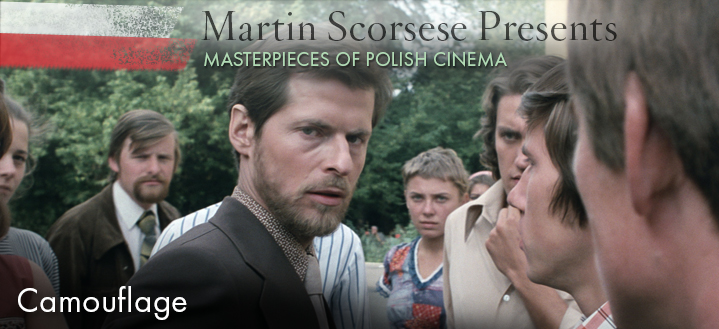
CAMOUFLAGE (BARWY OCHRONNE)
Poland, 1979, 196 minutes, Colour.
Directed by Krzysztof Zanussi.
An ironic comedy of manners - with more sombre tones. Made by celebrated Polish director Krzysztof Zanussi, while it observes manners in Polish society, it is clearly meant as a kind of allegory/parable of the Polish social and political situation. A group meets for a weekend seminar on language and grammar. Papers are presented, a prize is to be awarded. The young man of integrity who organises the competition makes a proper decision. The supervisor wants a safe decision - allowing for the prejudices of the rector. There is a lot of observation about the life-style of younger people, organisation and administration, boards and the integrity of decisions.
The film ends with a physical battle between the younger man and the older - an open-ended ending but an ironic comment on what has gone before. Zanussi's films have often a Bunuel-like presentation of society, for example The Contract, 1980. At other times he makes very intense personal dramas, for example The Balance, 1974, The Spiral, 1978. Zanussi himself appears and there are screenings of Camouflage in the 1979 ironic comedy Camera Buff, by Kieslowski whose Three Colours trilogy of the 1990s, Zanussi produced.
1. The qualities of Polish cinema - technical skill, a national industry? Representing Polish manners and styles? A critical reflection on Polish society and politics? (And reflection on the upheavals of the late seventies and early eighties?)?
2. The title and its ambiguity? Personal camouflage and the cover-up of individuals relating to others? Society and camouflage and not revealing truth? Government, administration and camouflage? The credits with the presentation of birds and animals - who are able to survive by camouflage? Camouflage and its use in warfare, self-preservation? The overtones of deceit?
3. The presentation of the convention - an analogy of society and politics? The range of individuals? Power, power struggles? Mutual influence? How well did the film work as a picture of the seminar? As an allegory? What conclusions would audiences draw about Poland?
4. The initial attention to detail - the arrival of the students, enrolment, questions of accommodation, sleeping quarters, washing, nude swimming in the river, recreations? The various groupings?
5. The focus on the competition - the papers presented, the quality of the research, jealousies, the decisions of the jury, the meetings, pressures? Decisions about the awards?
6. The Magister as hero? His having to cope with the administration, with personal relationships with the students and the staff? His romantic link with the visiting girl from England? his personal integrity? His relationship with the Docens, the insinuation of problems to come, accommodation, negotiation of students representing certain schools? His place on the jury and becoming the secretary? The Pro-Rector? and his points of view, intrigue? The interview with the Pro-Rector? and telling the truth? His having to handle the uproar? The possibilities of his future in research, administration? The Docens waking him up in the night, taking him to see the girl making love, their fight and the Magister fearing that the Docens was dead, the camouflaged deception? The finale with the physical fight representing what? A well drawn character, symbol?
7. The contrast with the Docens - smooth, his overseeing role, his camera and his photographing nature (and the trick played on him later by the students?), his standards, his relationship with the Pro-Rector? and the influence of the prize giving? His story about his relationship to the Pro-Rector? and writing his thesis - true or false? his influence on the Magister, smooth, the ability to cover up? His relationship with the serving girl? Why did he wake the Magister in the night, taking him to see the girl? Pretending to be dead? The fight? As a character, symbol?
8. The Pro-Rector? - his burly appearance, self-confidence, similarity to Soviet political leaders? His young wife, child? A prejudiced man, bullying? his talk with the magister? At the Awards? His external manner and his harsh pressurising?
9. The mad student - the school he represented, his protest, the award to keep him quiet, his reaction, hospitalisation?
10. The English girl and her work at the seminar, relationship with Magister, casual relationships, pleasant?
11. The range of students, their protest, the way that they were overruled?
12. The jury and their operations the various personnel represented, for example the fat lady?
13. The background thing of language, research? Related to reality or not? Related to social issues or not? The importance of chromatical research in itself? As a symbol for representing Poland in the seventies?
Published in Movie Reviews
Published in
Movie Reviews
Tagged under
Saturday, 18 September 2021 19:22
California Dreaming
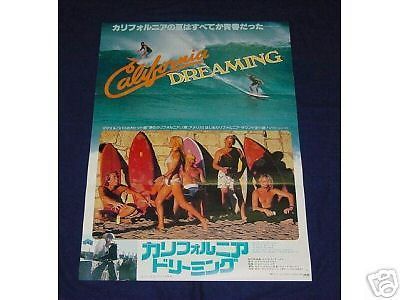
CALIFORNIA DREAMING
US, 1979, 92 minutes, Colour.
Glynnis O’ Conner, Dennis Christopher, Seymour Cassell, Tanya Roberts.
Directed by John D. Handcock.
A surfing film of Southern California. It takes its title from the popular song and tries to illustrate something of the dream of people coming to California as well as those who live there. That it is some kind of Paradise. However, people have to wake from dreams. The film is geared towards an adolescent young adult audience although some of the older stars are there for an older audience. The appeal is that of surf, sand and sex. Dennis Christopher, the star, appeared in Fellini’s Roma. Glynnis O'Connor has appeared in a number of films to good effect especially as Little Mo and in director John Hancock’s Baby Blue Marine with Jan-Michael? Vincent. California Dreaming reflects the permissiveness of the seventies and Southern California. It is also disappointing in not realising its potential.
1. The popularity of the surf films in the seventies? The audience interested in surf? The ethos of the surfies? Southern California and this way of life?
2. The focus of the title, its significance, overtones? reference to the song? The use of songs and music throughout the film?
3. The atmosphere of California with its beaches, the surf, surfing? Money? Poverty, affluence?
4. Fee and his arrival? Audience identification with him or not? The humour and naivety of his approach, his talk and the people mocking him? His guitar, memories of home, aim to succeed with surfing and the friendly encounter with Duke? His mistakes? His boasting? Background of drugs, sex? Did he learn or not? His good qualities, for example in the surf and the rescue? How typical of the young California dreamers? How seriously was he presented - or not?
5. Julie as a pleasant character, his talk, volley ball? Corky and his love for her and his attitudes towards her? His wife? dreams of Hawaii, proving his death? The Olympic Games? discovery of the truth about him? her virginity, her way of life around the attraction towards the boys, despising them? Her playing on the beach, swimming? Her attitudes towards Duke's ex-wife? prospect of going to college? The volley ball games? Outings, her disregard of T.T., gradually liking him? Their sexual encounter? The future?
6. Rick and his girl friend, the party, the sexual relationship, his vanity, his skill at surfing, the competition, his going out with other girls, his being led to the airport and his ticket being taken away? The background of the family and their supporting his going to Hawaii, taking it away?
7. The other surfers and their skill, going to the movies about surfing, friendships? Changing? Prospects of marriage and settling down? Injuries? Competitions? T.T. and his trying to become friendly with this group?
8. The film's presentation of the ethos of surfers and their achievement?
9. The relationship between Fay and Corky, the bonds between them. friendship? Advice about Fay and her relationship with Duke?
10. This world as a microcosm of the United States in the seventies, dreams, values?
11. The portrait of characters around the beach, the men, the women, attitudes towards one another?
12. The ending with Corky and T.T. clashing, loving each other, going out into reality or dreams? Duke and his death after dreams?
13. How enjoyable a film, how pleasant? How permissive? reflecting the realities of beach life?
Published in Movie Reviews
Published in
Movie Reviews
Tagged under